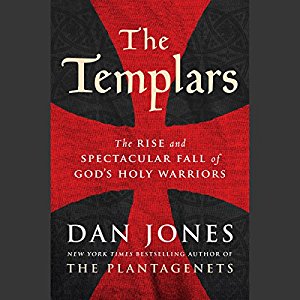 It would be hard to write a boring history of the Knight’s Templars. They were a Christian military order originally founded during the early years of the Crusades to protect pilgrims travelling to Jerusalem and other holy sites in the very dangerous lands of the Middle East. The Order’s story is inextricably linked with that of the Crusades, and you accidentally learn a lot about the latter just by reading this account of the former. It is hardly surprising then that the Templars have had a strong grip on popular imagination, from the Da Vinci Code to Indiana Jones. They also had a flair for iconography and symbolism, such as the big red cross they wore on their cloaks.
It would be hard to write a boring history of the Knight’s Templars. They were a Christian military order originally founded during the early years of the Crusades to protect pilgrims travelling to Jerusalem and other holy sites in the very dangerous lands of the Middle East. The Order’s story is inextricably linked with that of the Crusades, and you accidentally learn a lot about the latter just by reading this account of the former. It is hardly surprising then that the Templars have had a strong grip on popular imagination, from the Da Vinci Code to Indiana Jones. They also had a flair for iconography and symbolism, such as the big red cross they wore on their cloaks.
Dan Jones’s “Templars” a fairly conventional chronological narrative, and after a while the procession of battles, slaughter, castles and cities captured and lost, becomes a bit of a blur. Masters of the Order come and go, opponent warlords do the same, victories and losses take their turn. This is a very Western oriented history – the infidel hordes are differentiated only by their leaders, and there is no attempt to understand why they had such apparently inexhaustible resources (clue – because this was/is their homeland) or why they were able to repeatedly defeat supposedly superior Western European armies. Jones resists the temptation to draw parallels with modern conflicts in the Middle East, although these suggest themselves at times irresistibly.
Authors of histories need to address the “Why am I writing this book?” question in a way fiction writers do not. Normally answers range from “I have uncovered new material” – no such claim is made here – “I have a different interpretation from previous authors” – ditto – or “this topic has not been written about recently” – another ditto. So why was this book written? Jones may have hoped for a TV adaptation from this book – the settings are very photogenic – and this may be behind his tendency to leave chapters hanging on a cliff-hanger in phrases such as “William was not quite ready to act on the evidence he was compiling. But he could and he would”; “He would never see Cyprus again”; or “This was the moment when darkness began to fall on the Templars”.
I make no claims of expertise in this field, but I got the impression that Jones has based his work primarily on the chronicles of the Templars and their opponents. I would have thought an archaeological approach might have been worth considering – what do the ruins of the temples, castles, houses and farms of the Order tell us about their histories that the chronicles gloss over?
During my read of this text I came up with a theory about this category of book – serious but non-academic history. There’s a limit to how much information the brain can retain. This is a complex narrative spanning around two hundred years. The bibliography, glossary and appendices run to almost 100 pages. This condensation of such a vast amount of information in a non-academic work of history (I don’t mean Jones’s approach is non-academic, simply that the book is aimed at the general albeit studious reader, rather than historians or student) inevitably leads to the overwhelming weight of facts passing the reader by. It’s just not possible to retain all that information, unless you read the book as if you were going to be examined on it afterwards. So in the end you probably learn little more than if you were to read a few thousand words about the Templars on Wikipedia. I am not sure that is a problem or not – you can enjoy the book but use the internet if time is more pressing or you want to cover more ground.
I have a Templars book kicking around as well, though it’s a different one than yours.
I have a similar problem, re retaining knowledge from such books, but thought it was just me and my crappy memory. I think we retain more info than we realise but also, if the book is good, we get a good feel for the subject which we don’t get by just reading a Wikipedia entry.
LikeLike
Fair point re the feel for a subject, but it’s hard to tell how much goes in, as you say – no way you could test it. Wikipedia gets a hard press from some sources but I think it is a brilliant resource compared to what I grew up with!
LikeLiked by 1 person
I find Wikipedia very useful on a daily basis but I use it for quick (and pretty reliable) info. I don’t find it easy reading any long encyclopedia entries though and that’s why I would then prefer reading a book.
LikeLike